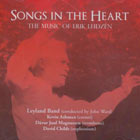Following on from the well received recording of the music of Dean Goffin, the latest release in aid of the Clarence Adoo Trust sees John Ward conducting Leyland Band in works by Erik Leidzen.
Joy
He is joined by a trio of top class soloists who present three of the composer’s best-loved solos in an attractively presented recording that is a joy to listen to, although the excellent sleeve notes by Ronald Holz take some reading due to the rather unfortunate choice of colour scheme on the internal booklet.
His musical setting of ‘Abide with Me’, dating from the end of the composer’s life and existing in two versions; one for mixed choir and piano and the other for wind band, is a highlight of this well crafted release.
Holz has produced a brass band version full of subtlety that is readily sympathetic of the composer at his best.
USA move
Leidzen moved to the USA from his native Sweden in 1915, taking up numerous leadership positions within the Salvation Army.
This link was to continue, even following a schism with the then USA Commander Evangeline Booth, that led to her banning him from formal involvement with the movement.
The row apparently took place at the end of the concert that featured the premiere of his march ‘EFG’, a tribute to band-leader Edwin Franko Goldman, for whom Leidzen went on to produce many of his wind band arrangements.
British Open
It was prompting by Eric Ball that led to Leidzen producing his British Open test piece, ‘Sinfonietta’ in 1955 - only the second time a composer from outside the United Kingdom had been used.
The excursions into fairly extreme key signatures, and the Eb bass solo hold no terrors for the present Leyland Band, but it is still good to have a new recording of this engaging work.
Notable
Leidzen’s solos are notable for the intricacies of the accompaniments; calling for a genuine partnership between soloist and band, and a steady hand in the middle.
They come across particularly well here, aided by John Ward’s sensible appreciation of pace and detail.
Popular
Ronald Holz points out that ‘Song of the Brother’ was originally for cornet, the title alluding to both the link with the composer’s sister, Margaret, and the secular song used ‘When You and I Were Young, Maggie’ - the associated religious text being written later.
The two selections featured are deservedly popular: The rather introspective ‘The Children’s Friend’ and the more out going, ‘None other Name’ both played with understanding and resonance.
Civil War
‘Post Bellum Rhapsody’ was written in 1959 to mark the centenary of the American Civil War, using various tunes from that era.
Although several of the melodies have been adapted for Salvation Army use, on this occasion it is the original context that matters.
Leidzen was a meticulous craftsman, even when writing what could be seen as relatively insignificant hymn arrangements and marches. That may be why such pieces remain so effective, especially as the MD and band treat them with due care and respect.
Warmth
John Ward has chosen the music well, presenting a good cross-section of Leidzen’s oeuvre, whilst Leyland is on fine form throughout, playing with warmth, control and balance.
This is a most enjoyable offering, with the added bonus of all the proceeds assisting a truly wonderful man and musician.
Peter Bale
Contents
1. Pressing Onward, 4.52
2. Songs in the Heart, Cornet soloist Kevin Ashman, 8.06
3. Post Bellum Rhapsody, 7.00
4. What a Friend, 1.52
5. Concertino for Band and Trombone, Trombone soloist Davur Juul Magnussen, 8.17
6. EFG March, 3.11
7. Sinfonietta, 11.57
8. Humouresque from Folk Songs for Band, 3.11
9. The Children's Friend, 6.26
10. The Song of the Brother, Euphonium soloist David Childs, 7.05
11. Abide with Me, Adapted and recorded by Ronald W. Holz, 4.27
12. Manhattan, 1.58
13. The Old Rugged Cross, Edited by Ronald W. Holz, 2.16
14. None other Name, 7.15










